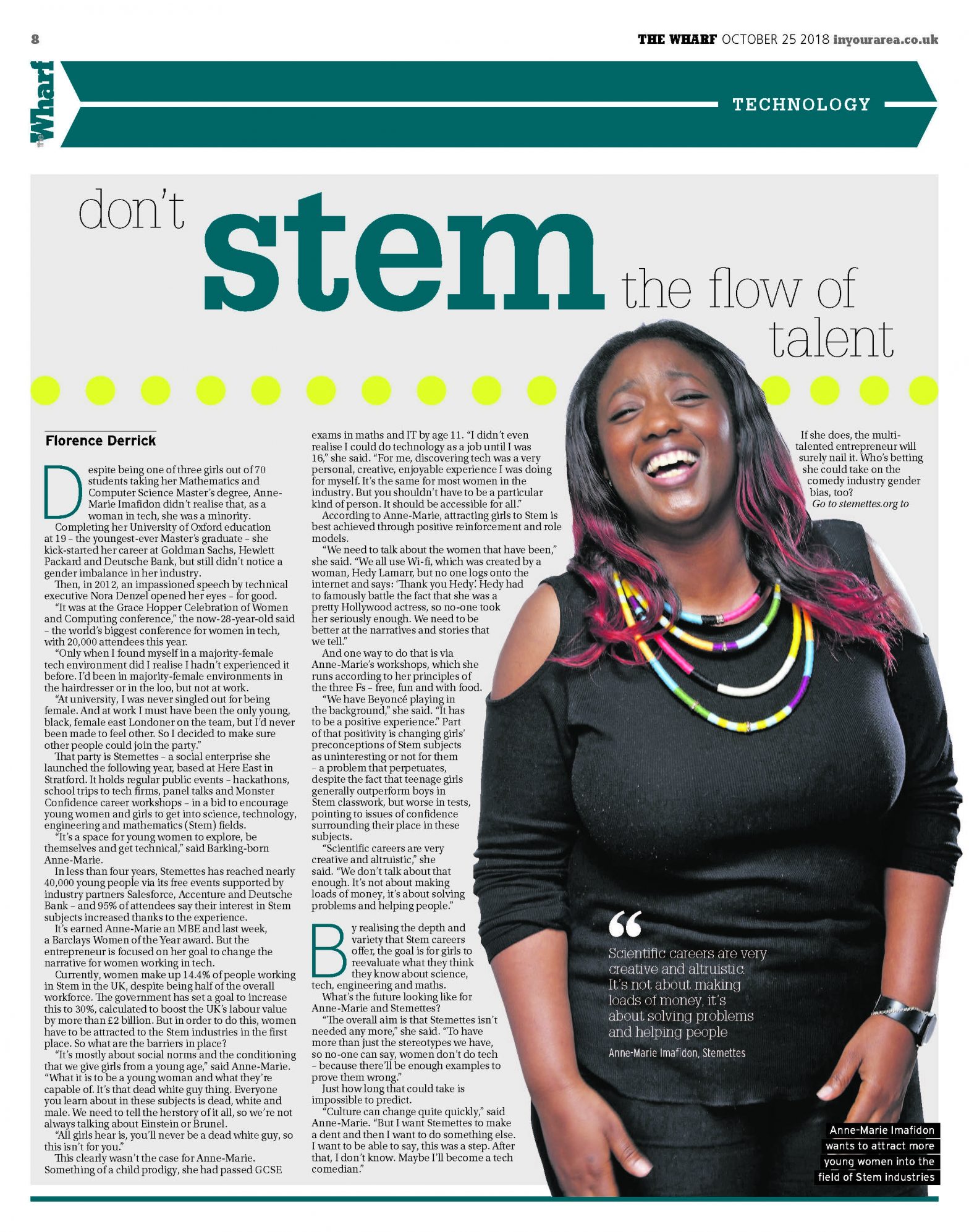Despite being one of three girls out of 70 students taking her Mathematics And Computer Science Master’s degree, Anne-Marie Imafidon didn’t realise that as a woman in tech, she was a minority.
After completing her University Of Oxford education at 19 – the youngest-ever Master’s graduate – she kick-started her career at Goldman Sachs, Hewlett Packard and Deutsche Bank, but still didn’t notice a gender imbalance in her industry.
Then, in 2012, an impassioned keynote speech by technical executive Nora Denzel opened her eyes – for good.
“It was at the Grace Hopper Celebration Of Women And Computing conference,” the now-28-year-old Anne-Marie said. It’s the world’s biggest conference for women in tech, with 20,000 attendees this year.
“Only when I found myself in a majority-female tech environment did I realise I hadn’t experienced it before. I’d been in majority-female environments in the hairdresser or in the loo, but not at work.
“At university I was never singled out for being female. And at work I must have been the only young, black, female east Londoner on the team, but I’d never been made to feel other.
“So I decided to make sure other people could join the party.”
That party is Stemettes, a social enterprise she launched the following year, based at Here East in Stratford. It holds regular public events – hackathons, school trips to tech firms, panel talks and Monster Confidence career workshops (held in tandem with the job site Monster) – in a bid to inspire and encourage young women and girls to get into science, technology, engineering and mathematics (Stem) fields.
“It’s a space for young women to explore, be themselves and get technical,” Barking-born Anne-Marie said.
In less than four years Stemettes has reached nearly 40,000 young people via its free events supported by industry partners Salesforce, Accenture and Deutsche Bank – and 95% of attendees say their interest in Stem subjects increased thanks to the experience.
It’s earned Anne-Marie an MBE and, on October 15 this year, a Barclays Women Of The Year award. But the entrepreneur is focused on her goal to change the narrative for women working in tech. Currently, women make up 14.4% of all people working in Stem in the UK, despite being half of the overall workforce.
The Government has set a goal to increase this to 30%, which is calculated to boost the UK’s labour value by over £2 billion.
But in order to do this, women have to see be attracted to the Stem industries in the first place. What are the barriers in place?
“It’s mostly about social norms and the conditioning that we give girls from a young age,” said Anne-Marie. “What it is to be a young woman and what they’re capable of.
“It’s that dead white guy thing. Everyone you learn about in these subjects is dead, white and male. We need to tell the herstory of it all, so we’re not always talking about Einstein or Brunel.
“All girls hear is, you’ll never be a dead white guy, so this isn’t for you.”
This clearly wasn’t the case for Anne-Marie, though. Something of a child prodigy, she had passed two GCSE exams, in maths and IT, by age 11.
“I didn’t even realise I could do technology as job until I was 16,” she said. “For me, discovering tech was a very personal, creative, enjoyable experience that I was doing for myself. It’s the same for most women in the industry. But you shouldn’t have to be a particular kind of person to do this. It should be accessible for all.”
According to Anne-Marie, attracting girls to Stem is best achieved through positive reinforcement and role models.
“We need to talk about the women that have been,” she said. “We all use Wi-fi, which was created by a woman, Hedy Lamarr. But no one logs onto the internet and says: ‘Thank you Hedy’.
“Hedy had to famously battle the fact that she was a pretty Hollywood actress, so no one took her seriously enough. We need to be better at the narratives and stories that we tell.”
And one way to do that is via Anne-Marie’s workshops, which she runs according to her principals of the three Fs – free, fun and with food.
“We have Beyoncé playing in the background,” she said. “It has to be a positive experience.”
Part of that positivity is changing girls’ preconceptions of Stem subjects as uninteresting or not for them – a problem that perpetuates despite the fact that teenage girls generally outperform boys in Stem classwork, but worse in tests, pointing to issues of confidence surrounding their place in these subjects.
“Scientific careers are very creative and altruistic,” she said. “We don’t talk about that enough. It’s not about making loads of money, it’s about solving problems and helping people.”
By realising the depth and variety that Stem careers offer, the goal is for girls to reevaluate what they think they know about science, tech, engineering and maths.
What’s the future looking like for Anne-Marie and Stemettes?
“The overall aim is that Stemettes isn’t needed anymore,” she said. “To have more than just the stereotypes we have, so no one can say, women don’t do tech – because there’ll be enough examples to prove them wrong.”
Just how long that could take is impossible to predict.
“Culture can change quite quickly, and this is a culture game,” said Anne-Marie. “But I want Stemettes to make a dent and then I want to do something else. I want to be able to say, this was a step.
“After that, I don’t know. Maybe I’ll become a tech comedian.”
If she does, the multi-talented entrepreneur will surely nail it. Who’s betting she could take on the comedy industry gender bias, too? stemettes.org
